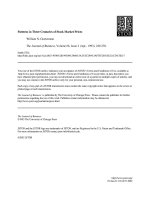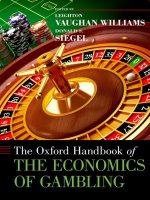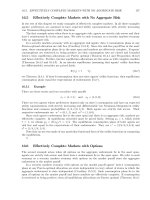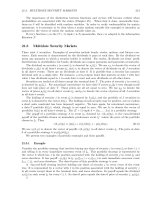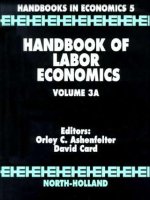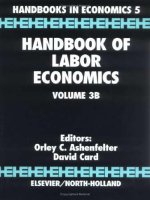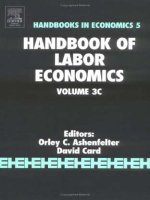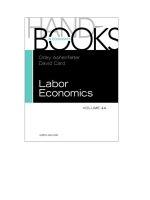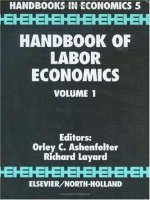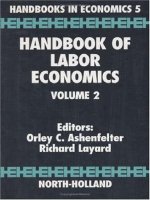Two centuries of parasitic economics
Bạn đang xem bản rút gọn của tài liệu. Xem và tải ngay bản đầy đủ của tài liệu tại đây (4.35 MB, 257 trang )
Book Reviewers
“A debut book delivers an appraisal of what ails Western economies… Al-Nakeeb, an independent
scholar with graduate economics training and a four-decade career in financial markets, surveys
classical, Marxist, Keynesian, and neoclassical economics. He concludes that only genuine
democracies…as after World War II, have shown any effectiveness in quelling cyclical financial
crises wrought by extremes of laissez-faire self-interest or authoritarian societal-interest. He proffers
a “unified theory of macroeconomic failure.” Its précis: “A moral deficit, typically driven by
plutocratic greed for wealth gathering, causes a democratic deficit, inferior public choice, immoral
policies, economic inefficiency, and negative externalities, culminating in macroeconomic failure.” In
other words, a greedy few use wealth to grab political power, rig the system, and enslave the debtridden many, à la the 2008 subprime meltdown…The author dismembers with a deceptively light
touch… His prose is crystal clear and flows like silk. He displays command of the subject and
provides rational evidence for his sweeping conclusions…he accomplishes his goal to “give
economics a good stir,” and presents his case in language accessible to all. His confident predictions
that the Eurozone will unravel and Western banks will fail to avoid another crisis look prescient
following the Brexit vote.
An audacious and caustic financial work that deserves wide readership and close academic
scrutiny.”—Kirkus Reviews
“At the heart of Al-Nakeeb’s tour de force is the… irreconcilable democracy and…“parasitic
capitalism.”…the inherently flawed classical economic models…still exhorted by “notable”
economists as if gospel…his “Unified Theory of Macroeconomic Failure,” consists of identifying
those “negative externalities” where the social costs far exceed the private cost, as causing economic
failure…include irrational taxes, amplified economic cyclicality, the re-emergence of monopolies
and monopsonies, along with the subversion of democracy by plutocracy and what he characterizes as
immorality in public policy.
…Al-Nakeeb’s own scholarly and professional background clearly inform the detailed treatment he
gives to the discussion of the negative externalities…providing a variety of economic solutions,
including equity financing models to replace debt, excise taxes on interest and splitting personal
taxation (one on earned income and one on personal capital). He also advocates a redistributive tax
on extreme wealth.
… He acknowledges the need for “students of political science” to “shed more light on the role of
plutocratic motives in historical political developments.” Al-Nakeeb correctly observes that
“macroeconomics is very political.” The privileged few seek to protect its power and wealth, making
avarice and “political motivation” two sides of the same coin…the concentration of media into a few
large corporations keeps the citizenry properly un(miss-)informed…Concentrations of wealth allow
the powerful interests to engineer elections…the 1980s…“counter-revolution.”…Al-Nakeeb notes
that Western governments find themselves today waiting passively for the next economic crisis to hit,
calling the “Great Recession of 2008” “an alarm bell.” He believes that while the next crisis carries
the potential for greater hardship should the plutocracy persist in their present policies, there is
promise of the next crisis becoming “the great cleanser”…
Al-Nakeeb’s contribution with this book is invaluable - not only in the wealth of insight it provides,
but in the ease with which it is provided - easily consumable by those not versed in economics,
finance or political theory.”—Portland Book Review
Two Centuries of Parasitic Economics
Basil Al-Nakeeb
Copyright © 2016 Basil Al-Nakeeb
All rights reserved.
First published in the United States
Distributed by Smashwords
This ebook is licensed for your personal enjoyment only. This ebook may not be re-sold or given
away to other people. If you would like to share this ebook with another person, please purchase an
additional copy for each person you share it with. If you’re reading this book and did not purchase it,
or it was not purchased for your use only, then you should return to Smashwords.com and purchase
your own copy. Thank you for respecting the hard work of this author.
Library of Congress Control Number: 2016901840
Cover Design Acknowledgement: Kristin T.
Ebook formatting by www.ebooklaunch.com
Acknowledgments
I am grateful to Roderick Grosvenor, my school principal, for letting me attend economics classes as
a listener at an early age.
I am also indebted to the late Nobel Laureate and father of econometrics, Professor Laurence Kline,
for inviting me to attend the University of Pennsylvania’s Wharton School as a visiting scholar, and to
Vahan Zanoyan, then managing director of Wharton Econometric Forecasting Associates.
Furthermore, I am obliged to Professor Fakhri Shehab, the former chief economic adviser to the Emir
of Kuwait and senior research fellow at St Anthony’s College, Oxford, for his incisive economic
views and invaluable discussions over the years.
To Dr. Abid Al-Aziz Al-Wettary, former deputy director of the Organization of Arab Petroleum
Exporting Countries (OAPEC), I would like to extend my gratitude for inviting me to publish my first
article in the OAPEC Journal.
I’m thankful to Professor Imad Moosa, professor of finance, RMIT, Melbourne, Australia, for his
excellent technical contributions and opinions when we worked together and subsequently. I
appreciate Dr. Usama AlJamali’s penetrating economic interpretations, Dr. Hamid Majid’s priceless
comments, and Hamad Al Benali’s excellent input.
My thanks to Dr. Pam for her extensive comments on the manuscript and general encouragement, to
Ayden Majid for her comments and encouragement, and to Jacqueline Ramey, Aileen Cho, Nanette
Day, and Linda Kleinschmidt for their tireless editing. I am delighted by and appreciative of
William’s line editing and most valuable comments.
I’m indebted to my wife, Iman, for her encouragement, to my daughter, Sema, for her invaluable
corrections, and to my son, Talib, for his understanding and patience.
And most of all, I’m indebted to my parents, who made sacrifices for my education and helped me in
innumerable other ways. To all of you, I offer my enduring gratitude.
B. S. T. Al-Nakeeb
Author’s Note: Readers can contact the author with their comments, requests for elaborations, and
questions by email via:
About the Author
Basil Al-Nakeeb (b. 1949) is an independent scholar. He has helped establish four investment banks
and a consumer credit company. His professional career, spanning four decades and three continents,
has mostly focused on stocks. His last stock recommendation sent the stock limit up four days in a
row. He extended Leontief’s input-output matrix (for which Professor W. Leontief received the Nobel
Prize a year earlier) to optimize national investment plans. He guided his research team to decompose
the secret currency basket of the Kuwaiti Dinar, earning huge interest spreads. He has written articles
and given talks on economics and finance. He holds an MSc. in Financial Economics (from the
University College of North Wales) and is a Chartered Financial Analyst (CFA). Al-Nakeeb lives in
Dubai with his wife and son.
Contents
1. Introduction
PART I: THE DIALECTIC PATH OF ECONOMIC THEORY
2. Classical Economic Theory
3. The Rise and Fall of Marxist Economics
4. Keynesian Cyclical Stabilization
5. The Fall and Rise of Neoclassical Macroeconomics
PART II: AN ALTERNATIVE MACROECONOMIC FRAMEWORK
6. The Unified Theory of Macroeconomic Failure
PART III: USURIOUS PRODUCTS AND INSTITUTIONS
7. Usury: Conquest by Stealth
8. The Ascent of Banking
9. Bank Instability, Products, and Economics
10. The Federal Reserve as an Extension of Banking Power
PART IV: CYCLICALITY, MARKET
INEFFICIENCY, AND DEMOCRACY
AND
PUBLIC
11. Amplified Business Cycles
12. Private Sector Inefficiency: Competition and Information Quality
13. Public Sector Inefficiency: Plutocracy vs Democracy
14. Measuring Democracy
PART V: ALTERNATIVE FINANCING AND TAXATION
15. The Next Revolution in Equity Finance
16. Public Finance and Indirect Taxes
17. Corporate Taxation
18. Regressive Personal Taxation
19. Progressive Personal Taxation
PART VI: OUTLOOK
20. The Gathering Storms
Appendix: Identifying Usurious Lending
SECTOR
Selected Bibliography
Notes
Detailed Contents
1. Introduction
Economics is a very dangerous science.
John Maynard Keynes
The ongoing debate about a crisis of capitalism in Europe and America is misplaced because the
failure is rooted in the degenerative democratic processes and not economics per se. Doubtless, much
of the wrong economic policies proposed by distinguished mainstream economists are not driven by
ignorance, although some are, but in support of political agendas that drive parasitic economic
policies, resulting in economic failure. The corollary to this is that, contrary to accepted notions,
moral macroeconomic policies promote public interest and economic efficiency, while immoral
economic policies run contrary to public interest and efficiency. Indeed, morality and macroeconomic
efficiency are so intricately interwoven that they are essentially inseparable and for good reasons, as
this chapter and the rest of this book will liberally demonstrate. Perhaps an example with ongoing
relevance would serve to illustrate.
The ironies of history are often perplexing but two in particular stand out, coming in quick succession
by historical standards and with momentous consequences for the West. The first irony was that it
took a communist tsunami that was sweeping the world in the aftermath of World War II to frighten
Western plutocracies (the money dictatorships) into granting their citizens substantial economic and
political democratic concessions; the resultant support for unionization, the rise in real wages, and the
adoption of the welfare state among many other positive policies had the unanticipated effect of
launching the longest capitalist economic boom on record. The other byproduct of the communist
phobia was a decade and a half of a modern version of the medieval Inquisition: McCarthyism. The
second irony was that the fading of communism in the 1980s eliminated Western plutocracies’ motive
for economic and political democracy, prompting the so-called Thatcher-Reagan revolution or more
precisely the Thatcher-Reagan counter-revolution because revolutions are the rebellions of the
masses against their despotic rulers not the reverse. The counter-revolution instigated the progressive
repeal of the economic and political democratization since World War II, thereby initiating the
process of economic and democratic degeneration.
Paradoxically, the rise and fall of communism was mirrored, at a varying pace, by a parallel rise and
fall in economic and political democracy and capitalist efficiency in the West. This meandering
Western political policy first produced rapid economic growth only to falter when those policies
reversed course, which included the empowerment of monopoly and the weakening of competition,
thereby raising the rate of return on capital in the monopolistic sector. This analysis challenges
Professor Piketty’s much touted explanation that the simultaneous rise in the return on capital and the
fall in economic growth caused the deterioration in economic inequality since the 1980s; Professor
Piketty’s analysis assigns blame for numerical values instead of the income redistributive policies of
the Thatcher-Reagan counter-revolution that favored the ultra-rich, which diverts attention away from
plutocracy’s central role in the deterioration of income distribution.
The cumulative excesses of the counter-revolution have set the stage for yet another tectonic political
transformation that could sweep the West in the aftershocks of the next deep recession or, in the
absence of reforms, the still deeper one to follow. The impending transition to moral capitalism and
democracy could be a turbulent affair or a smooth one, depending on the resolve of the ruling
conservative plutocracies to resist or accommodate political evolution, respectively. Moreover, the
harder the super-rich plutocracies obstruct reforms the more convincing it becomes that regulating
their wealth is a prerequisite for attaining genuine economic and political democracy. These critical
topics deserve a more through discussion, which must wait for now.
The lyrics of the song “Ain’t We Got Fun?” describe the anxious, hard times in 1921 in a fatalistic
tone, yet with an alarming resonance today. [1] The old familiar problems are back, like the poor
getting poorer and the rich richer. Decades ago, celebrated economics professor Joseph Schumpeter
observed, “More and more, the world seems about to sink in chaos, anarchy, or even a new
barbarism,” but he might as well have been speaking of today. [2] Imperceptibly, the wheel of time has
spun a full circle. After decades of decent living, mainstream neoclassical economists are guiding the
West (Western democracies) to the poverty of the 1920s.
Crises are not accidents. The public is unsure whether economic disasters are repeating like
Groundhog Day because economics has lost its relevance or because the high priests of economics
have lost theirs.[3] Too many economic pundits cannot let go of what someone once taught in the 19th
century. However, what is at stake is more profound than economics as such. As someone once
observed, big powers collapse from within, while small nations collapse from outside forces. This is
especially true in an age where the big powers have nuclear weapons. Two intricately intertwined
common denominators of disintegration from within are moral and economic decline. In a democratic
setting, the interpretation of moral decline must include democratic decline, as public choices in the
absence of a healthy democracy do not represent the interests of the majority.
Several intellectual heavyweights have doubted the correctness of the West’s present economic path.
Niall Ferguson (b. 1964), a renowned Harvard University history professor, in his thought-provoking
book The Great Degeneration, asks, “What exactly has gone amiss in the Western world in our
time?”
Another scholar, Eamonn Fingleton (b. 1948), published an insightful article in 2010 in the American
Conservative warning that the financial health of the United States has been deteriorating since the
1970s. He cites similarities to the more gradual decay of the Ottoman Empire in its final phase: free
trade, heavy expenditure on wars funded by a burdensome foreign debt, and extensive foreign direct
investments. The Ottomans reached the zenith of their power in the second half of the 16th century and
remained resilient for another two and a half centuries, until 1854. Then the decline began with trade
deficits and the accumulation of foreign debt. Fingleton notes that it took the United States a tenth of
that time to fade from its peak economic power to dependence on foreign debt, prompting him to warn
that the United States is at risk of financial implosion. He views the disappearance of US industries
and the ballooning of trade deficits as confirmations of this decline.
Fingleton’s warnings are certainly persuasive, with one proviso. The comprehensive Ottoman defeat
during World War I diminished the possibility of repairing that economy; the United States, on the
other hand, still has a sufficient, if shrinking, margin for changing direction. Nevertheless, the
Ottoman economic decline is symptomatic of the decline of great powers.
The lessons of history are valuable, but the most instructive are those from the recent past. In this fast
paced age, collapse is swifter too. In the 1960s, the crumbling economics of imperialism led to the
fastest mass-collapse of empires in history: the relinquishment of the British, French, Belgian, Dutch,
Portuguese and Spanish empires. [4] Faster still was the more recent disintegration of a great power,
the Soviet Union, when its economy imploded. Hence, whether at the center, right, or left of the
political spectrum, macroeconomic efficiency ought to become a prime concern for everyone.
Another lesson from those cataclysms is that a moral revival is a prerequisite for political and
economic revival, which together represent the West’s only line of defense against certain decline.
Complacent economists respond defensively that the United States still has a dominant economic
position. In that, they confuse elevation with direction. What matters most is tomorrow. Someone
descending from the peak of Mount Everest would have to persist for a long time before crossing
paths with anyone traveling in the opposite direction—America and China did pass each other,
heading in opposite directions, in 2014.[5]
The stack of bad policies, rooted in moral decline, which the United States has endured during the
past three and a half decades, are testimony to American economic resilience. Across the North
Atlantic, a parallel moral decline has nurtured similarly flawed economic policies that have
victimized Western Europe, requiring comparable solutions. [6] Economic healing calls for identifying
the causes of unrestrained indebtedness, industrial migration, economic-cycle amplification,
chronically high unemployment, spreading poverty, and anemic growth; these and a host of other
problems have constrained Western economies to operating well below their production-possibility
frontiers.[7] Improving long-term macroeconomic performance will require strategic economic
measures. The familiar fiscal and monetary policies are incapable of curing this malaise; the most
they can provide is temporary relief from symptoms that in time will reappear. The flawed
macroeconomic system needs new foundations. It will also require an unbending political will to
pass the much-needed reforms, despite the anticipated opposition of special interests. Moreover,
without the public’s participation, public interest will not take precedence over private interests.
In Search of Reliable Signposts
In these troubled and confusing times, where can the public turn for trustworthy economic information
and guidance?
Transitions are blurred processes without distinct beginnings and ends, but 1978 might have been the
last year before the onset of the age of corruption.[8] The decline that followed has been steady and
pervasive. For example, US economic statistics reflected economic conditions fairly before the
massaging of the data began in the 1980s. Politicians found it easier to “lower” unemployment and
inflation rates by changing their statistical definitions instead of the reality on the ground. Statistics
was made an early victim to cover up the incompetence of the new economics. Such are the
characteristics of the new age: things appear better than they feel, the ends justify the means, and
parasitic capitalism no longer embarrasses its preachers and practitioners.
Should investors trust the credit ratings?
The moral decline that inspired “creative” statistics has proliferated; credit agencies have lost all
restraint in their ratings, generously awarding “Triple A” to debts that default long before their
maturity.
Can shareholders trust corporate accounts?
Accounting firms too have not been immune from the general decline in ethics; they have misled
shareholders and would-be investors by overstating corporate profits and have sometimes issued
confident reports about companies on the verge of bankruptcy.
Do the media deliver reliable economic information?
To distract attention from the errors plaguing Western economic policies, media coverage of the 2008
meltdown trumpeted a tale of global economic crisis, even though most countries outside the West
only experienced a mild slowdown in their growth. China’s diminished growth rate was still the envy
of the world. Most economies in Asia, Latin America, and Africa, and in North, Central, and Eastern
Europe, continued to grow. The growth rate of the BRICS countries, at 4 percent, was six times faster
than that of the G-7, at only 0.7 percent. Now, in early 2016, Cyprus, Greece, Italy, Portugal, and
Spain are still in the grip of depression, while Great Britain, France, and Ireland go through doubleand triple-dip recessions.[9] The disintegration of the euro is looming. The survival of the European
Union is uncertain. The West is experiencing calamities, but the media consistently water down the
muddle.[10]
Could the big commercial and investment banks have provided quality advice?
It must have been tempting to listen to them. Having comprehensive economic and investment
research provided by the input of the highest paid and distinguished investment managers, economists,
and analysts with qualifications from the West’s most prestigious universities, the big banks did not
seem to lack first-rate advice. Yet, the 2008 crisis revealed a pitiful reality: those big institutions
were clueless and only colossal government bailouts kept them from sinking. If the insights of those
“top-notch” experts could not save their employers from de facto bankruptcies, should anyone risk
listening to them?
Did the Federal Reserve (Fed) offer the public a reliable assessment of the state of the US economy
in 2008?[11]
Despite evidence to the contrary, the Fed avoided reporting disagreeable facts and maintained an
optimistic outlook for as long as possible. At first, it denied there was a recession. Later, it admitted
a mild one and then a regular one. Only when its shareholders, the big banks, were on the verge of
bankruptcy and it needed to mobilize an enormous package to rescue them did the Fed scream
disaster. The recession deepened further until it became the Great Recession. Had it been the 1930s,
without Keynesian economics and with a much smaller government, the Great Recession would have
been another Great Depression. If the Fed’s economic radar, employing a thousand-odd economists,
cannot detect the worst economic calamity since the Great Depression, then what can it detect?
Did the government’s neoclassical economic advisors provide reliable guidance?
The 2008 crisis exposed the wide gap between reality and the perceptions of those economists. First,
they arrogantly assured the public that their theory predicts that a recession is impossible because the
deregulations they have instilled have made markets efficient, with near-instantaneous adjustments.
The deepening crisis baffled them. Their elegant and costly mathematical economic models proved
useless because their underlying theory was not valid, although they don’t admit it. Their
sophisticated economics reeks of intellectual snobbery, contrived complexity, commonsense
deficiency, and lack of utility. Their occupations provided them with comfortable livings, at a
prohibitive cost to the world. Moreover, since most of the government economic experts previously
worked for the banks, most notably Goldman Sachs, their expert opinions are hardly more enlightened
than the disastrous advice given to the banks.
To whom could the public have turned for reliable economic advice?
A rare breed of competent economists was in fact offering excellent advice, but regrettably, the
public could scarcely hear their warnings above the din of the media-picked “experts.” Dirk Bezemer
cited twelve economists who predicted the crisis.[12] Of these, seven were from the US: Dean Baker,
Michael Hudson, Eric Janszen, Kurt Richebächer, Nouriel, Peter Schiff, and Robert Shiller. The other
five were Wynne Godley and Fred Harrison from the United Kingdom (UK), Jakob Brøchner Madsen
and Jens Kjaer Sørensen from Denmark, and Steve Keen from Australia. I think of them as the
Magnificent Dozen.
For my part, I was not engaged in making public forecasts and made no explicit forecast of an
impending crisis, but perhaps an implicit one. In July 2008, I liquidated my entire stock portfolio and
went off on holiday to beautiful Cape Town, South Africa; I realized my largest cumulative profit
ever. I must admit, however, I did not suspect that the economy was in such bad shape.
Macroeconomics in Crisis
Politics aided by neoclassical economics have reversed the brief benevolence and prosperity that
followed World War II. Mahatma Gandhi, with his undoubted moral authority, once declared,
“Poverty is the worst form of violence.” Does this imply that the mainstream economists who
formulate the policies that are impoverishing hundreds of millions are committing crimes against
humanity? Would they ever cease and desist of their own accord?
Macroeconomics has lost its creativity and utility. Aside from the Keynesian stir during the 1930s, the
macroeconomic pot has been intellectually stagnant, despite feverish activity. Consider how much
technology has advanced since the Great Depression. We now have air-conditioning, cars with
automatic transmissions and tons of gadgets, giant aircrafts are flying millions of passengers daily,
space exploration, computers, mobile phones, the Internet, and big-screen TVs. Yet, illustrious
universities, Nobel Prize committees, and the media hail minor tweaks to 19th century economics as
great accomplishments, making the delivery of real value-added macroeconomics that much trickier.
A knowledge revolution has swept the world, while mainstream neoclassical macroeconomists have
clung to theories from two centuries ago. Is it any wonder the West is in perpetual difficulty? As will
become clear in due course, the same forces that have thwarted the development of macroeconomics
have also frustrated the development of political science and public finance, fields that are vital for
the development of a compelling macroeconomic theory and effective policies.
Adam Smith used the term political economy when referring to economics. It is a good description.
An appreciation of the realpolitik is essential for understanding why macroeconomic theories sway
like reeds in the political winds. Unlike microeconomics, macroeconomics is very political.
Doubtless, Marxist economics supports the proletariat, while Keynesian economics upholds the
middle and working classes, and neoclassical macroeconomics backs the ultra-rich plutocracy. [13]
With the demise of Marxism and the undercutting of Keynesianism, neoclassical macroeconomics has
had the field to itself for decades without an effective challenge from a theory that champions the
interest of the majority. Unfortunately, macroeconomics now serves a microscopic minority.
Economic propagandists have bent reality to convince voters that giving the ultra-rich a larger slice
of the national economic pie is in everybody’s interest. Universities indoctrinate freshmen students
that rationality is driving macroeconomics, whereas political agendas have tainted macroeconomic
textbooks, journals, and theory, rendering them unreliable, and unscientific. Identifying where
economic science ends and dogma begins is a challenge of the first order. Sadly, intellectual curiosity
and scientific objectivity have sustained too few macroeconomists.
Another grim problem facing macroeconomics is an unwarranted mathematical complexity that
ignores Leonardo da Vinci’s wise advice: Simplicity is the ultimate sophistication. [14] Complexity
has been the fashion for some time; its practitioners are typically the first to get lost in the intricate
math they weave, arriving at wrong conclusions and misguided policy recommendations. They fail to
observe two universal tests for any fruitful endeavor: relevance and common sense. As John Maynard
Keynes observed, “good, or even competent, economists are the rarest of birds.” The economic
muddle in the West today is testimony to the accuracy of his assessment. The risk to the majority of
people and the economy is the dearth of good economists not mathematicians.
Thus, mainstream neoclassical macroeconomists used complex methods to conclude that the
deregulation has rendered markets so efficient that fiscal intervention has become unnecessary to
counter recessions. During the late 1990s, the chief economist at the World Bank, Joseph Stiglitz,
observed that this misconception at the US Treasury and the International Monetary Fund (IMF) made
the East Asia crisis worse, yet they were still clinging to it by the time the Great Recession hit.[15]
Voltaire’s notion that “common sense is not so common” is especially pertinent to neoclassical
macroeconomics.[16] By contrast, Viscount Takahashi revolutionized macroeconomics, instinctively
and profoundly, without fancy math. [17] The math best follows from a distance to add finer touches
and rigor to an economic concept once common sense, rationality, qualitative analysis, and
observation have established its validity. Mathematical economics is not a substitute for these
essential tools. The careless application of mathematical economics has produced misconceptions
that have become accepted truths, leaving young economists the unenviable but critical task of
cleansing economics of many misguided hypotheses.
There are plenty of examples of economists’ abuse of mathematics. For instance, it is the basis of
securities markets efficiency theories, which supported deregulation and less supervision of
securities markets, resulting in financial fiascoes like Enron, Bernie Madoff, and the sub-prime crisis,
and the future crises emanating from the unregulated derivatives market. The truly sharp investors
never trusted those fairytales; their outstanding investment performance is testimony that markets are
not so efficient.[18]
Macroeconomics also suffers from chronic problems of habitual vagueness and hedged bets. These
practices have blocked accessibility of the subject for no justifiable reason, preventing the public
from participating in informed debates. The public needs to understand the real economic issues that
are affecting the lives of hundreds of millions.
Yet, the most solemn problem facing macroeconomic theory is its blatant disregard of morality,
rendering economic policy without a compass pointing to the true economic priorities.
The Economic Efficiency of Morality
Contrary to established economic dogma, depriving macroeconomics of morality renders it irrational
and as inadequate as medicine without chemistry. In the chapters to follow, the unified theory of
macroeconomic failure will show that morality is a most critical, yet widely neglected, economic
variable.[19] It may come as a cultural shock to many economists that economic efficiency and
economic morality go hand in hand and that morally deficient economic policies are, necessarily,
economically deficient too. Moreover, the reverse is equally true: inefficient economic policies are
necessarily immoral. Hence, morality is a quick and sure test of macroeconomic efficiency. This
stance is not driven by moralism but by uncompromising economic logic; those in doubt need to
ponder this matter deeply.
For now, let us illustrate how the lack of a moral compass renders economic policies terribly
misguided, inefficient, and unintelligent. Following the Great Recession, a morally correct economic
policy would have expedited a faster and more cost effective economic recovery instead of an anemic
one. Morality and public interest required bailing out the delinquent mortgage borrowers instead of
the banks, hitting multiple birds with one stone:
1. Offering government funding to delinquent mortgages at near-zero interest (as offered to the
banks) would have made most delinquent mortgages instantly affordable and sustainable,
benefiting millions of homeowners.
2. The easy credit terms would also have had the important benefit of stabilizing house prices, the
first step toward a recovery in housing construction and employment, benefiting millions of
workers and the economy.
3. The resultant higher rates of employment would have increased federal tax receipts and saved
the Treasury billions in unemployment and social security outlays, thereby recovering the cost of
the mortgage support, in part or in full.
4. The proceeds from low-cost government funding to homeowners would have repaid the banks’
nonperforming home mortgages, clearing their balance sheets of those dubious debts and
stabilizing their situation.
5. Banks that remained in difficulty despite repaying their doubtful home mortgages were
necessarily engaged in large, misplaced, speculative bets, well beyond their capacity for
sustaining the resultant losses. Those banks should have folded, as they did in Iceland.
6. The foregoing tack would have had the additional benefit of not clogging the courts with a
foreclosure tsunami.
7. Those still unable to sustain servicing their mortgages, due to job losses or otherwise, would
have been able to sell their properties at attractive prices, given the subsidized mortgages
attached.
8. At some point in the future, once those mortgages are sufficiently paid down and the economy is
in full recovery, commercial mortgages could then progressively replace government funding for
those who could afford it.
9. This morally correct economic policy, by achieving a broad-based recovery instead of
restricting economic support to the sickly banks, would have saved trillions of dollars in
subsequent aid to those banks in the form of multiple quantitative easing. It would have also
preempted the $16 trillion in secret funds, which the Fed provided to international banks and
corporations and which the Government Accountability Office (GAO discovered by sheer chance,
following the first full audit of the Fed ever.[20]
The preceding example illustrates that economic morality and efficiency are inseparable, two sides of
the same coin. Instead, Western governments’ immoral economic policies saved zombie banks with
taxpayers’ money only to have those same banks foreclose on home-owning taxpayers, leaving them
without shelter in the freezing cold and Western economies lingering in a twilight zone between
feeble recovery and recession. Treating bank shareholders as first-class citizens and mortgage
borrowers as second-class subjects is acceptable under financial feudalism but not in functioning
democracies. Immoral economic policies, besides their economic irrationality and inefficiency, are a
violation of democracy itself, because millions have been suffering unnecessarily for a few to benefit
immensely. In other words, moral economic policies are not just economically more efficient, but
also consistent with democratic principles.
The economic irrationality of immoral policies hardly stopped there. Where is the economic
rationality in the US federal government lending $700 billion to the big banks at very low interest
rates by borrowing from their subsidiary, the Federal Reserve, at a much higher interest rate? [21] For
its part, the Fed went on to magnify this economic absurdity many times over, under the label
“quantitative easing,” by offering its parent banks trillions of dollars more at cheaper rates than it
charges the Treasury and, ultimately, the voting taxpayers.
The prominent neoclassical economists did not object to the immoral, inefficient and irrational
economic policies cited above; they either did not grasp the flaws of those policies or they found
them acceptable.
Iceland’s handling of its debt problem is a valuable demonstration of the duality of economic morality
and efficiency. The enormity of the Icelandic banking debt, at 11 times Iceland’s gross domestic
product (GDP), made the moral economic choice easier because the immoral alternative was
economically catastrophic. By putting its people ahead of the banks’ lenders and shareholders,
Iceland, relative to its size, quickly recovered from the most devastating financial quandary in
history.[22]
Iceland’s moral solution was also the most cost-effective. Instead of squandering public resources on
supporting irresponsible banks, it let them go under. It could hardly afford to let politicking by the
failed banks stop the intrinsically capitalist process of creative destruction, which wiped out their
equities and debts. It then recapitalized them as new banks with clean balance sheets and new
managements, using a better business model and a streamlined cost structure. In due course, the
Icelandic public will earn a profit from selling its stake in the new banks instead of shouldering a
huge burden of lingering liabilities. Moreover, Iceland’s policy will teach its banks valuable
discipline by establishing that no bank is too big to fail, thereby preempting a potent source of
financial blackmail.
The Icelandic lesson is illuminating for anyone who wants to see. Within four years, unemployment in
Iceland was down to 4.5 percent and its economic growth was 3.5 percent, the fastest in Europe. To
put the economic efficiency of the Icelandic solution in proper perspective, one only needs to
compare it to the Greek muddle.
The Greek crisis began in 2009, about the same time as that of Iceland. Lenders and their governments
intimidated the Greek government into abiding by the austerity policies they prescribed. By 2015, the
lending banks had pushed Greece into a deep depression, with average unemployment around 25
percent and youth unemployment over 50 percent. With no light at the end of the tunnel, the most
talented Greeks are emigrating.
In the absence of morality, the West implemented schizophrenic capitalism: gentle socialist policies
for the banks and harsh capitalism and economic Darwinism for the rest.[23] For the United States and
Greece, anti-societal policies came at a prohibitive cost. By contrast, the Icelandic solution, by
letting the losers lose, was consistent with economic morality, efficiency, capitalism, and democracy.
Why Read This Book?
Is the Great Recession a taste of things to come? How does it compare with the Great Depression?
Why is the West the epicenter of crises and stagnation? What policies guided the West to this
economic quagmire? Why is the West addicted to debt? How did the Western economies become
financial casinos? What was the contribution of the powerful banks to all of this? Does corporate
income tax—contrary to the claims of public finance textbooks—increase instability, promote
inefficiency, and stifle growth? Is personal income tax economically rational? Should we tax interest?
There are many more questions, all left unanswered. Mainstream neoclassical economists are not
even considering those problems, never mind proposing solutions. In an interview with Charlie Rose,
a noted economist compared the situation to a deer frozen by incoming headlights.[24]
This book will answer these questions and many more besides. It will do so by looking at the big
picture as well as the details. It will rely on known facts, common sense and uncompromising
economic logic, a modest dose of imagination, and a deliberate focus on the essential and disregard
of the nonessential. It seeks to deliver convincing macroeconomic analysis and practical solutions
that are readily understandable, using economic terms sparingly and avoiding theoretical niceties that
have little real-world significance. Moreover, to explain why defunct macroeconomics is still with us
in spite of the evidence of its past failure, I will undertake to sketch the historical and political
context of its conception, the interests it serves, and its systematic marketing.
This book has been simmering in my mind for three decades, time enough to learn a few new ideas
and to shed many. The crash of 2008 and its aftermath sharpened my focus. Consequently, I have spent
a good part of the last five years listening, researching, learning, and intermittently writing but mostly
pondering because, like so many things, ideas cannot be hurried; they take time to ripen. Endless
editing and reviewing of this work, intended to make it easier to read, has had the unexpected
dividend of sharpening my own understanding of the issues.
I have been fortunate to enjoy a degree of flexibility in arriving at my current conclusions, being free
of any baggage of previously published material requiring defending or retracting. I set out knowing
what I wanted to say, but at some vague turn the book seemed to take over. What is now before you
surprised me; it may surprise you too. Seeing the end of the exercise was like chasing a mirage. I was
nudged along by a sense of public service, by my own curiosity, and most of all, by my love for
economics that dates back to a chance encounter as a youngster, when I read about why Great Britain
devalued the British Pound in 1958 in a book titled Cyclopedia of World Events, as I recall.
Advances in technology were my good fortune too; it made my work easier and better. I am grateful to
all the programmers and innovators who brought us Microsoft Word, the Internet, BrainyQuote, The
Free Dictionary, Amazon, and Google search, but my greatest gratitude goes to Wikipedia. Wikipedia
was my brilliant and untiring research assistant; it was a revelation. It permitted me to bring to the
attention of the reader little-known facts and half-forgotten truths that are essential for the correct
interpretation of economic events. I was also lucky to have learned economics before neoclassical
macroeconomics colored the subject in the 1980s. Naturally, all errors in this book are mine.
On the question of style, John Maynard Keynes advised, “Words ought to be a little wild, for they are
the assault of thoughts on the unthinking.”[25] George Orwell, the author of the frightening futuristic
novel 1984, cautioned, “In a time of universal deceit, telling the truth is a revolutionary act.”[26] In
setting the tone of this book, I took the advice of Keynes and the challenge of Orwell; it is neither
hedged nor subtle, because it would have made things easier on the perpetrators of the economic mess
in the West. I admit that criticizing past economic theories is unfair because today we have the benefit
of more information and hindsight, and because the great thinkers of the past cannot answer back.
Still, silence is not a path to economic progress, considering that macroeconomic theory has been in
need of rousing for a long time. At the same time, this book seeks to give credit where credit is due,
particularly where academic institutions and the economic literature have failed to do so.
This book is a dialogue not just with students of economics but also with students of public finance,
banking, investment, political science, and sociology. Most of all, I wanted the general public to see
the possibility that good economics, stripped of the fog of political ideologies, can dramatically
improve the lives of people. To that end, this book mostly avoids technical terms and uses a wealth of
examples to make things clear. Public opinion is possibly the best impediment against the relentless
enforcement of flawed economic policies by the political elite. The public needs to become an
interested party because it has endured the worst consequences of parasitic economics that has
precipitated debt crises, unfair taxation, and misdirected public expenditure.
I have used italics to highlight new or rarely used economic concepts and for emphasis. Economics
books repeat the phrase ceteris paribus, meaning other things being equal or held constant. In what
follows, to avoid boring the reader by repeatedly invoking this phrase, let us agree that it applies
wherever it is relevant and it will not be mentioned unless necessary to clarify a particularly delicate
shade of meaning. One last point regarding style deserves mentioning. Well-known facts that are
well-documented by readily available sources were deemed to render statistical tables unnecessary,
unless absolutely required for explaining a particular concept such as the structural transformation of
business cycles following 1942. This less encumbered approach permitted a smoother flow of ideas
and the covering of vast grounds using a limited space.
Following this introduction, Part I provides an overview of the macroeconomic landscape, the
conflicting theories, and their uneven progress. It covers classical, Marxist, Keynesian, and
neoclassical theories. It explores their contributions, but especially their oversights and errors that
hindered the progress of macroeconomics. Part II introduces the unified theory of macroeconomic
failure, an alternative framework for explaining and solving economic problems and financial crises.
Parts III and IV apply the unified theory of macroeconomic failure to diagnose a range of chronic
macroeconomic problems, including indebtedness, monetary policy, amplified cyclicality,
monopolies, low-quality information, and ailing democracies’ failure to make economically efficient
public choices.[27] Part V proposes economically efficient and rational financial and tax alternatives
that conform to the guidelines of the unified theory. Part VI concludes with an economic and political
outlook.
The present economic system is demonstrably wobbly, yet no alternative economic architecture has
surfaced to replace it. Moreover, if you suspect (as I do) that the financial breakdown in 2008-2009
was not a passing glitch on the economic radar and we ignore its warnings at our peril, then I urge
you to read on. A fascinating journey through time with distinctly different perspectives and a world
several degrees removed from where you expect it awaits you. Together, we will inspect the very
foundations of parasitic economics and the roots of economic crises, expose popular economic
myths, discard obsolete dogmas, and consider alternatives. It is my sincere hope that the analysis will
keep the reader engaged, stimulated, and rewarded to the very end. Because of the abundance of its
novel concepts and distinctly different interpretations, this book will likely generate controversy and
debate—I hope that debate will spark many creative ideas. Finally, if you decide to read on, kindly
take the time to share your reflections and thoughts with your peers because it will enrich economics.
PART I
THE DIALECTIC PATH OF ECONOMIC THEORY
2. Classical Economic Theory
(1776-1873)[28]
It is preoccupation with possessions, more than anything else, that prevents us from living
freely and nobly.[29]
Bertrand Russell
Studying the progress of macroeconomics requires segregating economics into its micro and macro
components. Briefly, microeconomics studies the behavior of economic participants as individuals
and firms and the demand and supply they generate for goods and services, which determine market
prices. By contrast, macroeconomics looks at the big picture of the economy as a whole, focusing on
aggregate economic variables such as total demand and supply in an economy, employment, inflation,
and growth. Early economists were infatuated with markets and their apparent efficiency. However,
markets’ inability to resolve macroeconomic crises during the first half of the 19th century, prompted
Karl Marx (1818-1883) to label those early theories classical, meaning obsolete.
This chapter examines the impact of the classical theory on macroeconomics, particularly its choice
of economic driver, its economic decision-makers, and the conditions surrounding these; appreciation
of these early concepts is vital to understanding current macroeconomic problems.
The Pioneers
The pioneering economists contributed a wealth of economic ideas for almost a century between
1776 and 1873, while Europe was transitioning from feudalism to industrialization. Inevitably, the
prevailing class structure colored their outlook. They laid the foundations of modern
microeconomics, such as demand, supply, price, markets, the division of labor, and factor incomes:
wages to labor, rent to land, and profit (interest) to capital. Theirs was individual effort; they did not
think of themselves as belonging to a particular school of thought. In contrast to their considerable
contribution to microeconomic theory, they had limited success with macroeconomics.
The four distinguished classical economists were:
Adam Smith (1723-1790) was Scottish. In 1776, he published his seminal work, The Wealth of
Nations, making him the father of classical economics.[30]
David Ricardo (1772-1823) was a British political economist. He developed the concepts of the
labor theory of value, comparative advantage, the law of diminishing returns, economic rent, and
Ricardian equivalence. His theory of comparative advantage and specialization by nations supported
free trade, and consequently he opposed the British Corn Laws. He made a fortune speculating on
financial markets, which allowed him, in later life, to purchase a seat in the British Parliament.[31]
Jean-Baptiste Say (1767-1832) was a French businessman and economist. He was a strong advocate
of free markets. Say’s Law states that supply creates its own demand. [32] As with several classical
concepts, it is more valid at the micro level than at the macro level. For instance, the introduction of a
new gadget, like a new mobile phone, creates its own demand. However, it would be a mistake to
extend this analysis to the macro economy because the demand for the new gadget is likely a demand
shift away from older gadgets (e.g., an earlier version of the mobile phone), with little impact on
aggregate demand. However, on rare occasions Say’s Law could conceivably extend to the macro
level if a series of innovations drive large investments at the same time, as suggested by Joseph
Schumpeter (1883-1950) in his innovations cycle.[33]
John Stuart Mill (1806-1873) was a British economist, an influential social philosopher and the last
and most moral of the pioneers. He was against slavery and supported free speech, individual
freedoms, women’s suffrage, and proportional representation. In his later years, he advocated
economic democracy, labor unions, and farm cooperatives, and opposed unrestrained capitalism.[34]
A fifth “economist,” Reverend Thomas Malthus (1766-1834), was an Anglican cleric whose
admirers consider him a pillar of classical economics and habitually include him with the pioneers.
His often cited contribution to economics was a mistaken impending crisis theory that presumed
populations would grow exponentially while agricultural production would only grow linearly,
resulting in mass starvation, unless population growth is checked. Malthus had not realized that
agricultural production had kept pace with population growth by clearing marshes and forests and
increasing agricultural yields through the use of metal-bladed ploughs, crop rotation, etc.[35] His
worst transgression on economics was in advancing flawed economic arguments to benefit the British
feudal aristocracy by lobbying for the British Corn Laws, which resulted in the deprivation and
starvation of millions in Great Britain. Hence, he could hardly belong to the above-mentioned league
of pioneers of classical economics.
The other mistake was to exclude the veritable macroeconomics pioneer, Jean Charles Léonard de
Sismondi (1773-1842), from the list of pioneers. De Sismondi was a Swiss economist and the father
of macroeconomics and business cycle theory. Among his other noteworthy contributions was to
refute David Ricardo‘s general equilibrium theory and its focus on the long run. Instead, he
understood markets’ inability to self-correct in a reasonable period and called for a larger
government role in economic stabilization, which Keynes would later advocate as well.[36] By
rejecting de Sismondi’s contributions, classical economics remained incomplete and without a viable
solution to economic contractions; hence, economic crises continued unabated until the 1940s,
providing a foothold for Marxism and all that flowed from it. Curiously, neoclassical economists’
rejection of Keynesian macroeconomics in the 1930s mirrored the classical rejection of de
Sismondi’s theories a century earlier.
Critical Classical Assumptions
Assumptions about the real world are the foundations of economic theory. Their validity, realism, and
completeness are prerequisites for a robust theory. Hence, careful examination of those assumptions
is equivalent to inspecting the very foundations of a theory to reveal its strengths and weaknesses.
Classical theory adopted heroic, simplistic assumptions such as the idea that markets are perfectly
competitive, efficient, and self-regulating. It also assumed that self-interest, sometimes referred to as
Adam Smith’s hidden hand, is the sole driver of economic participants as consumers, savers,
investors, and businesses. Regrettably, capitalist economic theories have adhered to this crucial
assumption of a single economic driver.
Let us begin by clarifying the relationship between self-interest and capitalism. Some capitalist
enthusiasts have mistakenly attributed self-interest to capitalism. No doubt, capitalism has achieved
much, but it could not have implanted self-interest in the mind of the human species. Self-interest and
the profit motive permeate the economy and the markets because they are part of our survival instinct.
They are hard-wired into our psyche.[37] For countless millennia before capitalism, self-interest was
one of our built-in autopilots, helping us survive and adapt. In Mesopotamia, it likely gave rise to the
first barter trade—a free market without government interference—marking the birth of capitalism.
Free markets proved an economic wonder, most of the time. However, we should not become
infatuated with them the way classical economists were and the neoclassical economists since. We
should not lose sight of the fact that markets and capitalism are manmade and, therefore, bound to be
imperfect and occasionally disastrous.
Classical economics also makes idealized assumptions about economic man (homo economicus),
such as the following:[38]
1. He is perfectly rational.
2. He has perfect information, or at least the necessary information, for making rational and
correct decisions.
3. His decision-making process rationally weighs and selects alternative outcomes.
4. Self-interest is the sole arbiter between alternative courses of action.
5. His actions, driven by self-interest, are not only beneficial to himself but also to society.
If economic behavior is at least sometimes inconsistent with these assumptions, then it is reasonable
to conclude that such assumptions do not fully define economic behavior and it becomes paramount to
identify what else drives it and under what conditions.
Self-Interest, Rationality, and Instinct
Classical theory tends to overemphasize logic and rationality in human behavior and to ignore the
role of instinct. This is understandable; people hold logical deduction in high esteem because it has
cleared the path to many scientific discoveries, while instinct has animal connotations, even
irrationality. Yet, humans only began using formal logic recently—a mere few thousand years ago—
while instinct has played a vital role in human survival since the beginning of our existence. Instinct
is easily mistaken for irrationality because its logic is fuzzy, deep, and more complex than formal
logic, arriving at conclusions that frequently challenge those based on formal logic. Carl Jung (18751961), the celebrated Swiss psychiatrist, psychotherapist and founder of analytical psychology, once
remarked, “We should not pretend to understand the world only by the intellect. The judgement of the
intellect is only part of the truth.”[39]Once again, since self-interest itself is a consequence of our
survival instinct then, instinct necessarily plays a big role in our decision-making, including in
economic matters.
Rationality, logic, and other deductive tools work best when we have comprehensive information
about a problem and sufficient time to consider it carefully and unemotionally, as in designing a
functional and cost-effective building. However, in real life such prerequisites are frequently missing
when making important, but time-critical, decisions. Often, it is not just that we do not know
everything about an issue, but also that we do not know how much we do not know about it. Scientific
advancement is a good illustration, frequently compelling us to revise our scientific knowledge.
Indeed, the deductive process can be overwhelmed by a diversity of opposing influences, requiring,
among other things, the assignment of factor weights, a situation that a well-honed instinct, with its
fuzzy processing of information, can better handle.
Doubtless, instinct, vague and complex though it may be, is most effective for processing large,
incomplete, and uncertain information and making decisions at lightning speed. Without realizing it,
we make such decisions numerous times every day, instinctively. For example, when something
happens abruptly on the roadway, the driver has to respond immediately and instinctively. Even in the
arts and sciences, an instinctive sixth sense unencumbered by rigid rationality has shepherded our
most creative inspirations.
Instinct and logic are frequently so intertwined that it is difficult to draw the line between them. By
way of illustration, imagine a herd of gazelles grazing serenely in the wild. A twig breaks. Some
gazelles instinctively run; others stop grazing and look about to ascertain the source. Presumably, the
latter group is rational because instead of running for no clear reason, they seek a rational explanation
for the sound before deciding to run or stay. They could be rationally weighing the cost and benefit of
running versus staying: the calories expended in running and the opportunity cost of calories lost by
not grazing against the benefit of avoiding an uncertain risk.
Shortly thereafter, a leopard springs and captures one of the “rational” gazelles. Those that stayed
behind took a risk to obtain better information, so as to rationally decide whether to stay or run. When
they got the information, it was too late for one of them. Thus, the rational gazelles learned the hard
way that in the absence of perfect information, pursuing rationality at the expense of instinct proved
irrational for one of their lot.
Let us explore the complexity of this situation further. What else might have motivated the gazelles to
run or stay? Was it differences in their individual circumstances? Perhaps the gazelles that ran had
fuller stomachs, which afforded them the loss of actual and potential calories, while those that stayed
behind were hungry (the equivalent of rich versus poor). Alternatively, were the gazelles that ran
closer to the source of the sound, permitting them to assess the risk better by virtue of superior
information? Perhaps they had survived previous predatory attacks, giving them more experience in
assessing risk. Maybe some behaved as a herd, surrendering their will to those closest to them in
running or staying, as panicked humans do. This example illustrates how the same stimulus can
produce different responses due to differences in circumstance (e.g., biological needs, availability of
information, experience, and herd behavior).
A variation on the previous example is a stock market crash that affects a large percentage of the
investing public. Again, the same type of stimulus could propel different reactions due to the rational,
instinctive, or emotional processing of the stimulus, as well as differences in individual
circumstances such as wealth, indebtedness (full vs. hungry gazelles), information, experience,
education, psychology, and self-discipline. Moreover, incomplete information can yield bizarre
outcomes where, in retrospect, rational behavior could turn out to be irrational and instinctive
behavior, rational.
However, even this degree of uncertainty about motives understates the real complexity of the
situation. Fear can overwhelm the senses, while a false sense of security and inertia can dull the
instinct, with implications for financial and other markets. Another level of complexity applies to the
human species because it comprises of both prey and predators. In other words, there are human
equivalents to both leopard and gazelles, with diametrically opposite motives.
Clearly, rational self-interest is an inadequate explanation of the broad spectrum of human behavior.
Insufficient Information, Emotion, and Irrationality
Investment is central to economic activity. It entails expending time, effort, and capital resources in
the near term in anticipation of a larger, though uncertain and more distant, return. Profits compensate
investors for their effort, the risk of loss, the delay in recovering their principal, and the
inconvenience of illiquidity. These basic concepts apply whether the investment is a corner grocery
store or a multi-billion-dollar petrochemical complex.
People tend to invest when they are optimistic about the future and overinvest when they are overly
optimistic. Similarly, they tend to stop investing when they are pessimistic and to liquidate their
investments when they are very pessimistic. Moreover, the emotions of optimism and pessimism are
often contagious, producing bouts of overinvesting followed by shutting off the investment spigot or
even the mass liquidation of investments. Man fears what he does not know and a sudden awareness
of the inadequacy of information can trigger a panic.
The foregoing simplified investment and economic cycle mirrors an emotional cycle that does not
conform to the classical model of rational self-interest. Indeed, too often, the investing public acts
irrationally, without sufficient information and without the foresight to spot market turning points,
contrary to the expectations of the classical model. At the same time, the rational self-interest model
has some validity. For example, the most successful investors, like Warren Buffett, control their
emotions, collect the necessary information, and undertake the required analysis to make rational
decisions that yield outstanding returns on their investments—but they are the exception, not the
rule.[40]
Positively Sloping Marginal Utility Curves
For the thirsty, the first mouthful of water provides the greatest satisfaction or utility. Successive
mouthfuls provide decreasing utility until the thirst is quenched and drinking stops. This illustrates the
economic law of diminishing marginal utility of consumption. It is portrayed graphically as a
negatively sloping curve, with utility on the vertical axis and quantity consumed on the horizontal.
This is the normal and rational consumption pattern.
However, there are also irrational, compulsive, consumption patterns, such as overeating, smoking,
gambling, alcoholism, and drug addiction. Such harmful consumptions violate the classical principles
of self-interest and rationality.
Indeed, some behaviors appear driven by self-interest and rationality, but are in fact compulsive. The
preeminent example is compulsive wealth gathering; religions wanted to spare humanity the burden
of avarice and its unrestrained adoration of gold, wasting lives in pursuit of an irrational and
compulsive urge. Worse still, when money gathering occurs by depriving the disadvantaged, it
becomes sadistic; wealth without charity suffocates the humanity of the wealthy, reducing them to
gold zombies. Unlike communism, religions did not contemplate wealth confiscation, but rather a path
to emancipation from gold bondage through contentment.
Wealth accumulation, as a store of value to provide for future consumption, is very rational. For
normal people, the demand for wealth is a derived demand for future consumption; therefore, its
underlying utility curve is normal and negatively sloping. Excessive wealth is unnecessary because
humans have limited life spans and limited present and future consumption needs, whether it be food,
drink, clothing, shelter, security, entertainment, or extravagance. Hence, the need for wealth gathering
is finite.
When the urge for more riches is overpowering and exceeds any rational present and future
consumption needs, it crosses over from normality to compulsive behavior and irrationality. Future
